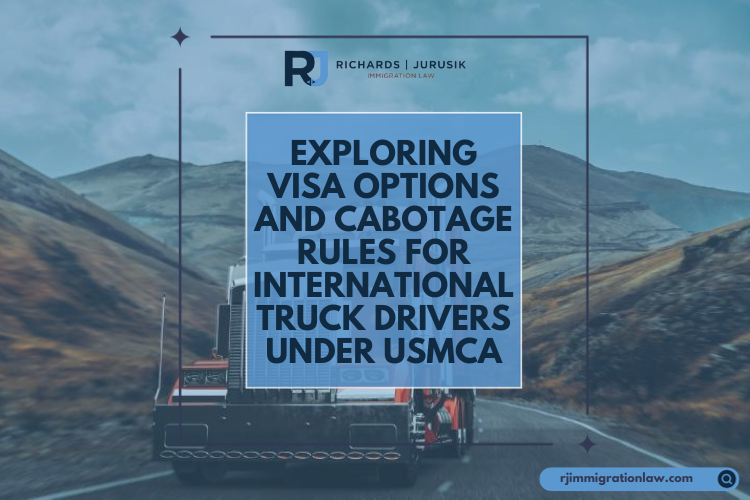International truck drivers play an indispensable role in the interconnected trade environment among the United States, Canada, and Mexico. This guide aims to shed light on their significant contributions, the concept of cabotage, and the visa alternatives accessible under the USMCA (United States-Mexico-Canada Agreement).
Understanding “Cabotage” in the Context of International Trucking
Cabotage refers to the transportation of goods or passengers within a single country by a foreign-based operator. In the United States, strict regulations are in place to protect domestic transport services. Essentially, foreign operators are prohibited from conducting internal cargo movements within the U.S.
Restrictions and Allowances for Foreign-based Operators
Foreign-based truck operators, however, play a vital role in international trade. They are permitted to:
- Transport goods from Canada or Mexico into the United States.
- Collect return shipments from the U.S. for delivery back to Canada or Mexico.
- Participate in other similar cross-border activities, as long as they adhere to the “stream of international commerce” principle outlined by the U.S. Customs and Border Protection (CBP).
Conversely, activities such as intra-U.S. deliveries or soliciting domestic shipments while in the U.S. are strictly off-limits to foreign-based operators.
Visa Options for International Truck Drivers
Regarding visa options, tractor-trailer operators do not fall under the TN Visa category, as this profession isn’t listed as a qualifying profession under the USMCA Chapter 16 Appendix-2. Nonetheless, these drivers can engage in cross-border transportation using a B-1 visa, within the confines of cabotage rules.
For enterprises seeking greater operational flexibility beyond the B visa constraints, the E-2 and L-1 visas offer viable solutions. The E-2 Visa is applicable for those who have significantly invested in a U.S. enterprise, while the L-1 Visa suits foreign companies with an affiliate office in the U.S., allowing these operators to compete directly within the American market.
E Visas for Traders & Investors
L-1 Visas for Business Expansion into the US
Additional Outside Resources
- Entry of Foreign Based Trucks – 19 CFR § 123.14(a)
- DHS – Guidelines for Drivers Engaged in Cross-Border Traffic
- 8 CFR 214.2(b) – Visitors
Subscribe to Our Resources Blog
Schedule a Consultation with an Immigration Lawyer
We Can Help!
You may have questions regarding U.S. immigration laws and visas. We invite you to reach out to our team at Richards and Jurusik for detailed guidance and assistance. Our goal is to provide you with the most accurate and up-to-date information to make your immigration process smoother and less stressful. The immigration lawyers at Richards and Jurusik have decades of experience helping people to work and live in the United States. Read some of our hundreds of 5-star client reviews! Contact us today for an assessment of your legal situation.







